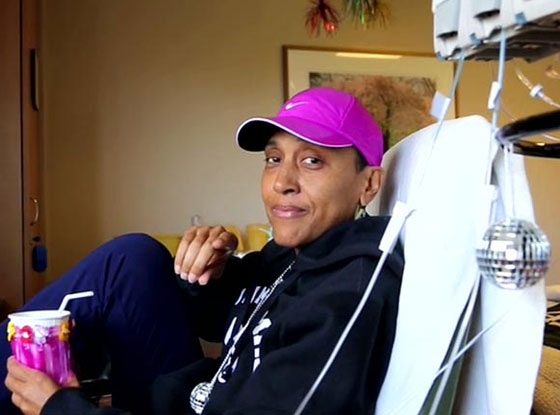 ABC News
ABC NewsRobin Roberts is taking it easy.
The Good Morning America cohost is awake and resting after undergoing a bone marrow transplant yesterday in New York City, E! News confirms.
"This journey is as much about the mind as it is the body," the 51-year-old Roberts said in a video message. "Thoughts are so powerful. You've got to change the way you think in order to change the way you feel. And let me just say this lastly, I feel the love and I thank you for it. Thank you."
Roberts, who just completed eight days of chemotherapy, had the transplant to treat a rare blood disorder, myelodysplastic syndrome.
According to ABC News, Roberts was surrounded by her siblings as well as many of her colleagues including World News anchor Diane Sawyer and GMA weatherman Sam Champion.
"It was an emotionally scary and yet exhilarating moment, one that I'll never forget," Champion told the network.
In the 10 days leading up to the transplant, the morning show anchor endured difficult chemotherapy treatments to ready her body for the five-minute procedure in which donor cells from her sister, Sally-Ann, were injected into her body with a syringe. Before the transplant got underway, the Rev. A.R. Bernard, a family friend, said a prayer, and when it was all over, Robin and her family reportedly burst into singing one of her favorite songs, "Ain't No Mountain High Enough."
"I will now wait and anxiously watch and see what happens," Roberts said after the procedure. "In the next seven to 10 days my counts will continue to go up and we'll be on to phase three, which will be get out of here. Get out of here. Go home. It's a journey."
Dr. Gail Roboz, the oncologist treating Robin at the New York-Presbyterian Hospital/Weill Cornell Medical Center, told ABC News that while her patient sounds energized and can't wait to get out of bed and leave the hospital, she'll lack energy over the new few days, may feel persisent indigestion and heartburn, and will have little in the way of an appetite, not to mention she'll have chills and possibly a fever. Roberts, however, will continue to receive intravenous fluids, electrolyte replacement and antiviral, antibacterial and antifungal medications.
"We have to roll with the punches over the next few days because, don't forget, her systems are down and Sally-Ann's aren't up yet so we're in that in between zone of watching very carefully," said the doctor. "We are wanting every day to be a good day but we are ready for some bumps in the road."
In other words, it will take time for the veteran journalist's immune system to rebuild itself.
Roboz added that she and other physicians won't expect to see major signs of recovery for about 10 days. But if all goes well and Robin avoids infections and other complications while the "new cells are setting up shop," as the good doc puts it, Roberts will go home after 30 days—though she'll still be on significant medications to regulate her immune system. She'll then be closely monitored in the months after that through the first 100 days.
(Originally published Sept. 20, 2012 @ 5:15 p.m. PT)